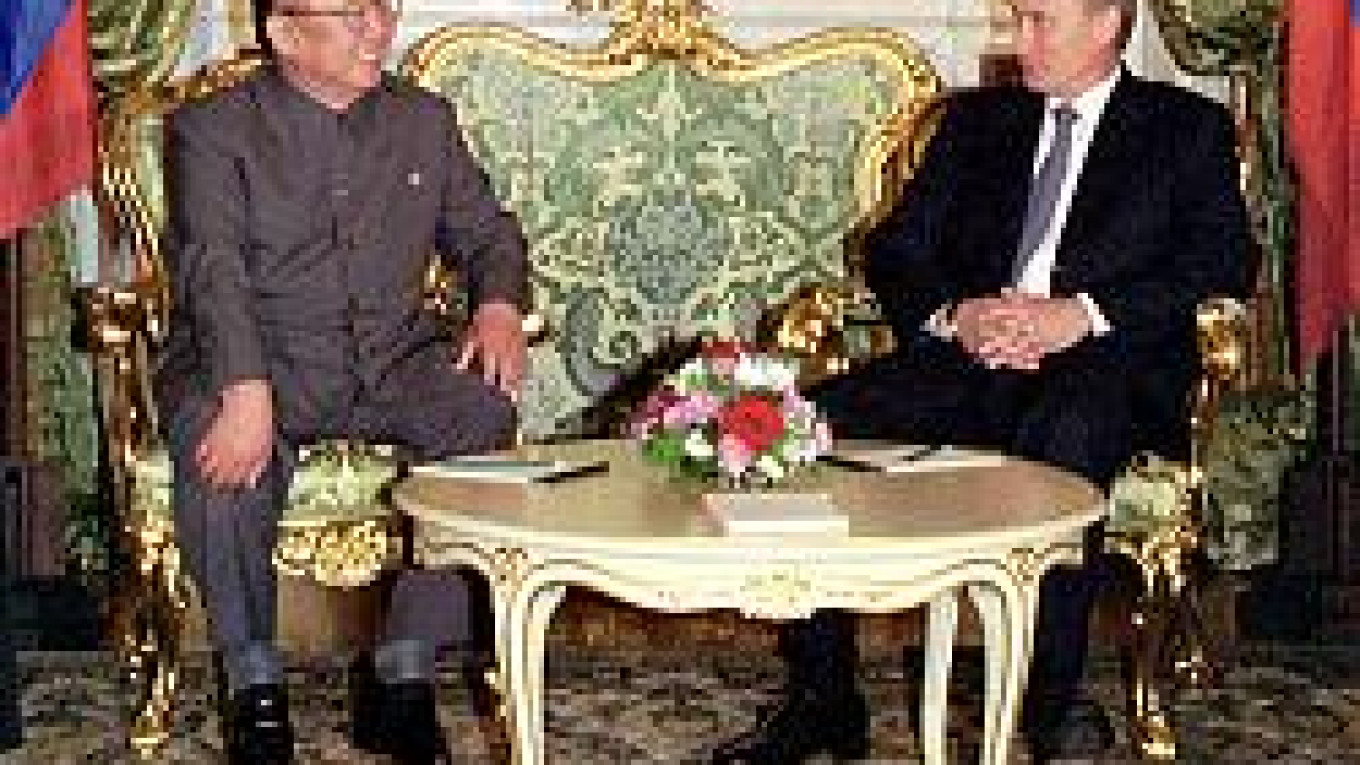Amid tight security, Kim visited the Khrunichev space center outside Moscow, where he was shown a full-size replica of the Mir space station, Itar-Tass said. He also inspected workshops that make space rocket carriers.
Later, the North Korean leader visited the mission control center in Korolyov, also near Moscow, which controlled the flight of the Mir station for 15 years.
Kim was accompanied on the tour by Deputy Prime Minister Ilya Klebanov and Yury Koptev, head of the Russian Aviation and Space Agency, Itar-Tass said.
The visits came on the third day of Kim's stay in Moscow. The visit was Kim's first to Russia and his third abroad since he took power after his father and president, Kim-il Sung, died in 1994. He has visited China twice.
Kim's state-related visits reflect North Korea's growing interest in exploring space for peaceful purposes, Itar-Tass said.
During his first meeting with Putin in Pyongyang, the North Korean capital, last year, Kim reportedly expressed a willingness to abandon his country's missile program if other countries help it launch satellites.
In Saturday's meeting with Putin, however, Kim said his country will continue to develop its missile program, claiming that it is peaceful and poses no threat to any country that respects Pyongyang's sovereignty.
A manifesto issued at the end of the meeting, which Kim called a "great success," was full of Soviet-style language and indirect criticism of the United States ?€” but it contained no surprises. The two leaders issued a similar statement after meeting last year.
In the so-called Moscow Declaration, North Korea confirmed its plan to continue missile development but vowed to observe a promised missile-test moratorium until 2003.
Kim announced the 2003 moratorium during his meeting with Putin last year.
Washington is seeking Moscow's consent to revise or abandon the 1972 Anti-Ballistic Missile Treaty, which its anti-missile program would violate, possibly as early as this winter. Russia strongly opposes amending the treaty.
"The 1972 Anti-Ballistic Missile Treaty is the cornerstone of strategic stability and the foundation of further reduction of strategic offensive arms," the Moscow Declaration said.
It gave no clue as to whether North Korea is willing to reopen talks with the United States anytime soon. North Korea has yet to respond officially to U.S. President George W. Bush's offer of dialogue on June 6.
North Korea instead renewed its demand for an end to the U.S. military presence in South Korea. About 37,000 U.S. troops are stationed there as a deterrent against military threats from the North.
Before their meeting Saturday, their first on Russian soil, the reclusive, 59-year-old North Korean dictator visited Vladimir Lenin's tomb on Red Square, becoming the first world leader to do so since the Soviet Union disintegrated a decade ago.
Kim arrived in Moscow late Friday night after a nine-day train trip of more than 6,400 kilometers across Russia's expanse that has been cloaked in secrecy and tight security.
Former Soviet President Mikhail Gorbachev on Saturday criticized security arrangements for Kim as "something that took place only in the times of Stalin," in remarks broadcast on Russian television.
Kim and Putin embraced repeatedly Saturday before posing for Russian television cameras in the ornate Grand Kremlin Palace, sitting on green-upholstered sofas with elaborate gold frames.
Later, Putin hosted Kim at a dinner and Kremlin concert in his honor.
Kim stayed in the Kremlin guesthouse used by his father in 1984 during a visit to Soviet leader Leonid Brezhnev.
The meeting, for all its political undertones, appeared also aimed at pragmatic economic cooperation. Russia promised to help rebuild dilapidated power and other industrial plants in North Korea built with Soviet support and technology.
But it indicated that its support would be linked to North Korea's settlement of debts to Moscow, estimated at $5.5 billion.
The declaration also said the two countries will closely work together on linking Russia's Trans-Siberian Railroad with the rail systems of the two Koreas, which could dramatically boost Asia-Europe trade across Russian territory. This project, it said, "is entering a stage of active development."
On Sunday, seven protesters were detained after holding an unsanctioned demonstration outside the North Korean Embassy against Russian friendship with the Stalinist government.
Kim left for St. Petersburg later Sunday. He will return to Moscow on Tuesday and leave for home by train the next day.
A Message from The Moscow Times:
Dear readers,
We are facing unprecedented challenges. Russia's Prosecutor General's Office has designated The Moscow Times as an "undesirable" organization, criminalizing our work and putting our staff at risk of prosecution. This follows our earlier unjust labeling as a "foreign agent."
These actions are direct attempts to silence independent journalism in Russia. The authorities claim our work "discredits the decisions of the Russian leadership." We see things differently: we strive to provide accurate, unbiased reporting on Russia.
We, the journalists of The Moscow Times, refuse to be silenced. But to continue our work, we need your help.
Your support, no matter how small, makes a world of difference. If you can, please support us monthly starting from just $2. It's quick to set up, and every contribution makes a significant impact.
By supporting The Moscow Times, you're defending open, independent journalism in the face of repression. Thank you for standing with us.
Remind me later.


